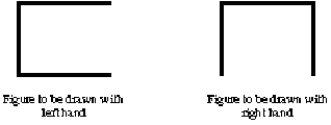Exam 7: The Control of Action
Exam 1: A Brief History of Cognitive Neuroscience55 Questions
Exam 2: Cellular Mechanisms and Cognition65 Questions
Exam 3: Neuroanatomy and Development75 Questions
Exam 4: Methods of Cognitive Neuroscience64 Questions
Exam 5: Sensation and Perception65 Questions
Exam 6: Object Recognition65 Questions
Exam 7: The Control of Action65 Questions
Exam 8: Learning and Memory64 Questions
Exam 9: Emotion45 Questions
Exam 10: Language63 Questions
Exam 11: Hemispheric Specialization64 Questions
Exam 12: Attention and Consciousness64 Questions
Exam 13: Cognitive Control65 Questions
Exam 14: Social Cognition65 Questions
Exam 15: Evolutionary Perspectives65 Questions
Select questions type
Franz and colleagues (1996)asked a patient who had had his corpus callosum surgically severed to draw figures like the ones here,each simultaneously with a different hand.
 Compared to neurologically intact control participants,they found that this patient
Compared to neurologically intact control participants,they found that this patient
(Multiple Choice)
4.9/5  (41)
(41)
Loss of blood flow in the ________ is the most common cause of hemiplegia.
(Multiple Choice)
4.8/5  (39)
(39)
Keele's work with people with Parkinson's disease suggests that they may have difficulties in which of the following cognitive operations?
(Multiple Choice)
4.9/5  (39)
(39)
Compare and contrast the neurological disorders of Parkinson's disease and Huntington's disease.How are they similar,and how do they differ?
(Essay)
4.8/5  (30)
(30)
After suffering a focal brain injury,a patient has great difficulty in pantomiming particular motor actions such as turning a key in a lock.Because other problems like hemiplegia,muscle weakness,sensory deficits,and lack of motivation have been ruled out,your diagnosis would be
(Multiple Choice)
4.9/5  (36)
(36)
The concept of endpoint control refers to the observation that voluntary muscle events
(Multiple Choice)
5.0/5  (38)
(38)
Which of the following statements best describes the population vector associated with a reaching movement from left to right?
(Multiple Choice)
4.7/5  (41)
(41)
In performing a sequence of complex actions,such as playing the piano,each movement is planned primarily in relation to the immediately preceding and subsequent movements.
(True/False)
4.8/5  (46)
(46)
A patient has damage to the basal ganglia,particularly within the striatum,and demonstrates both chorea and hyperkinesia.What is your diagnosis?
(Multiple Choice)
4.8/5  (31)
(31)
The term embodied cognition refers to the idea that our conceptual knowledge is grounded in knowledge about the body and movement.
(True/False)
4.7/5  (39)
(39)
When you first learn how to execute the complex motor sequence that comprises a slam dunk in basketball,a circuit including the ________ is active.After much practice,once you have learned the sequence well,a second circuit involving the ________ is active.
(Multiple Choice)
4.9/5  (38)
(38)
Studies of deafferentation and its effect on movement control in humans and other species demonstrate that
(Multiple Choice)
5.0/5  (38)
(38)
Which of the following types of motor behavior probably relies the most on the function of a central pattern generator?
(Multiple Choice)
4.7/5  (36)
(36)
Which of the following would demonstrate the finding that some aspects of motor learning are independent of the specific effectors used to perform an action?
(Multiple Choice)
5.0/5  (38)
(38)
Describe the neurological condition apraxia.How does this disorder inform our understanding of how complex movements are represented in the brain?
(Essay)
4.9/5  (44)
(44)
What disorder is characterized by a loss of dopaminergic fibers in the substantia nigra,which results in deficits in initiating voluntary movements,bradykinesia,and the progressive emergence of a resting tremor?
(Multiple Choice)
4.8/5  (41)
(41)
Showing 41 - 60 of 65
Filters
- Essay(0)
- Multiple Choice(0)
- Short Answer(0)
- True False(0)
- Matching(0)